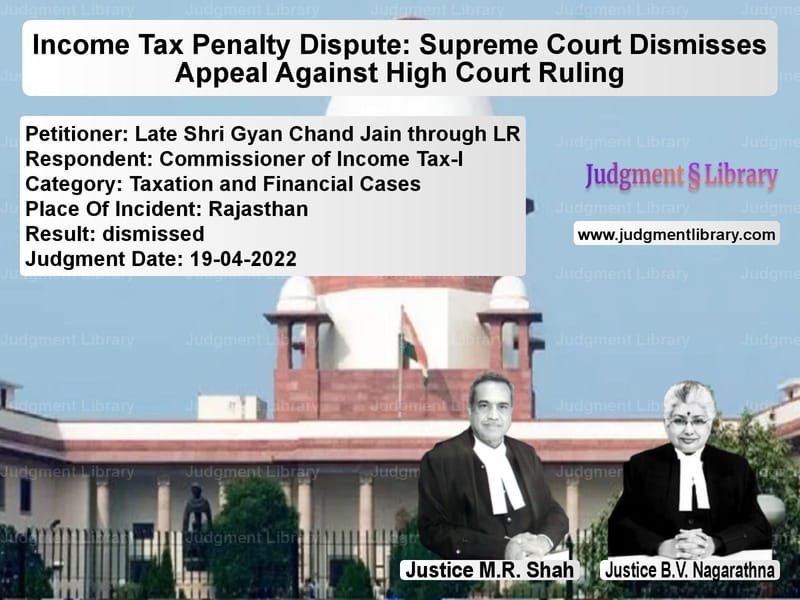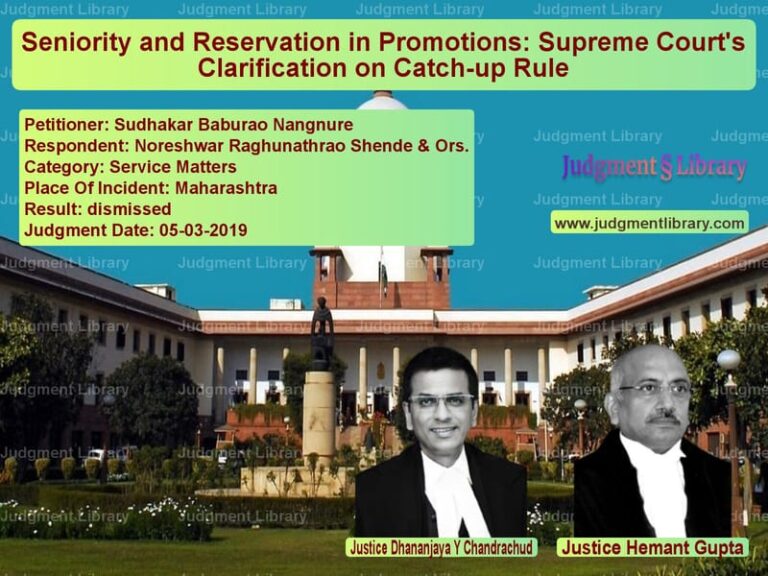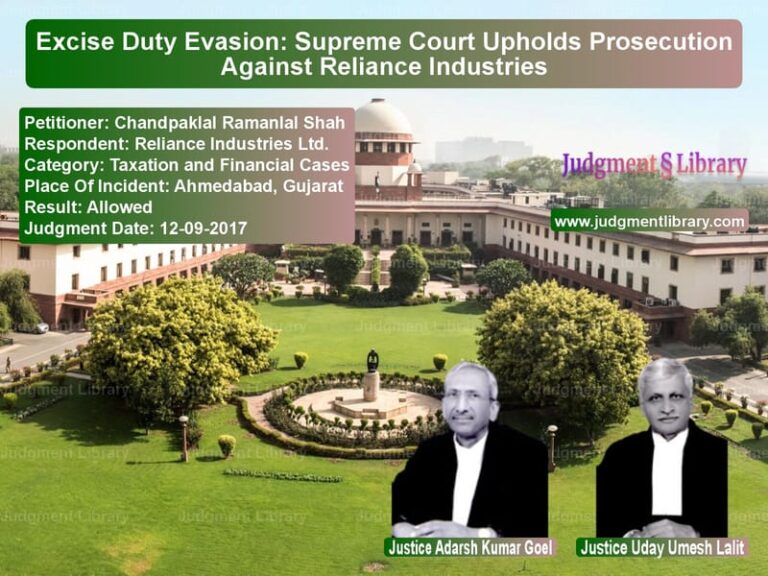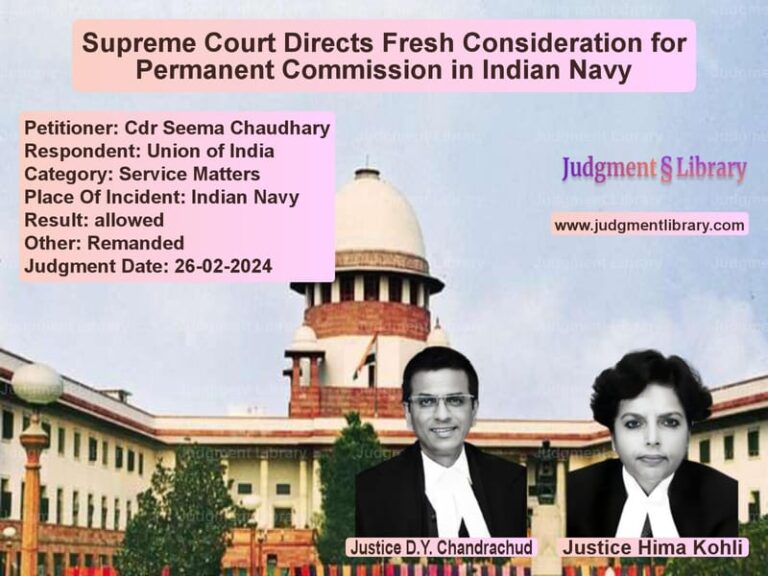Income Tax Penalty Dispute: Supreme Court Dismisses Appeal Against High Court Ruling
The Supreme Court of India recently ruled in Late Shri Gyan Chand Jain vs. Commissioner of Income Tax-I, dismissing an appeal against the Rajasthan High Court’s decision that upheld a penalty under Section 271(1)(c) of the Income Tax Act. The judgment clarified the applicability of the Central Board of Direct Taxes (CBDT) circular regarding tax effect limits for appeals and reaffirmed the jurisdiction of tax authorities in penalty proceedings.
The ruling underscores the importance of statutory definitions in tax law and the limited scope of relief available under the CBDT circular. It also establishes that subsequent reductions in penalty amounts do not affect the maintainability of appeals filed at the original penalty level.
Background of the Case
The case involved an appeal against the Rajasthan High Court’s decision that reinstated a penalty imposed under Section 271(1)(c) of the Income Tax Act. The Income Tax Appellate Tribunal (ITAT) had earlier deleted the penalty, but the High Court reversed this order.
The dispute centered on whether the penalty was correctly imposed and whether the Revenue’s appeal before the High Court was maintainable, given that the penalty amount was later reduced below the monetary limit set by the CBDT circular.
Petitioner’s Arguments
The appellant, represented by legal counsel, raised the following key arguments:
- The appeal filed by the Revenue in the High Court was not maintainable as per CBDT Circular No. 21 of 2015, which restricts appeals where the tax effect is below Rs. 20,00,000.
- The penalty amount had been reduced to approximately Rs. 6,00,000, which was below the threshold for appeals to the High Court.
- The jurisdiction of the Additional Commissioner of Income Tax in granting approval for imposing penalties was questionable.
Respondent’s Arguments
The Commissioner of Income Tax-I, defending the penalty, argued that:
- The appeal was valid because the original penalty imposed was Rs. 29,02,743, which exceeded the threshold of Rs. 20,00,000.
- The subsequent reduction in penalty could not affect the maintainability of the appeal filed when the penalty amount was higher.
- The High Court had correctly interpreted the jurisdiction of the Additional Commissioner, and the penalty was imposed within legal authority.
Supreme Court’s Judgment
The Supreme Court bench, comprising Justices M.R. Shah and B.V. Nagarathna, dismissed the appeal and upheld the High Court’s ruling. The key observations made by the Court were:
- Applicability of CBDT Circular: The Court clarified that the circular’s monetary threshold applies at the time of filing the appeal, not based on subsequent reductions in penalty amounts.
- Maintainability of the Revenue’s Appeal: The Court ruled that the appeal was valid as the initial penalty exceeded Rs. 20,00,000, even if later adjustments brought it below this limit.
- Jurisdiction of Tax Authorities: The Court found no merit in the appellant’s challenge to the authority of the Additional Commissioner, holding that statutory provisions clearly empower tax officials to impose penalties.
- No Grounds for Interference: The Court stated that the High Court had correctly analyzed the facts and law, and there was no justification for overturning its ruling.
Implications of the Judgment
This ruling has significant implications for tax litigation and penalty proceedings:
- Clarification on CBDT Circular: The judgment reinforces that the monetary limit for appeals is determined at the time of filing, preventing taxpayers from using later penalty reductions to avoid scrutiny.
- Strengthening Revenue’s Position: The ruling affirms the right of tax authorities to pursue appeals based on initial assessments rather than revised amounts.
- Judicial Oversight of Tax Penalties: The decision highlights the importance of legal consistency in penalty proceedings, ensuring that tax authorities act within their statutory framework.
Conclusion
The Supreme Court’s ruling in Late Shri Gyan Chand Jain vs. Commissioner of Income Tax-I sets an important precedent for tax disputes involving penalty appeals. By affirming the validity of appeals based on the original penalty amount and upholding the jurisdiction of tax authorities, the judgment provides clarity for future litigation. It reinforces the principle that taxpayers cannot evade appellate scrutiny by securing reductions in penalty amounts after an appeal has been filed.
Petitioner Name: Late Shri Gyan Chand Jain through LR.Respondent Name: Commissioner of Income Tax-I.Judgment By: Justice M.R. Shah, Justice B.V. Nagarathna.Place Of Incident: Rajasthan.Judgment Date: 19-04-2022.
Don’t miss out on the full details! Download the complete judgment in PDF format below and gain valuable insights instantly!
Download Judgment: late-shri-gyan-chand-vs-commissioner-of-inco-supreme-court-of-india-judgment-dated-19-04-2022.pdf
Directly Download Judgment: Directly download this Judgment
See all petitions in Income Tax Disputes
See all petitions in Tax Refund Disputes
See all petitions in Banking Regulations
See all petitions in Judgment by Mukeshkumar Rasikbhai Shah
See all petitions in Judgment by B.V. Nagarathna
See all petitions in dismissed
See all petitions in supreme court of India judgments April 2022
See all petitions in 2022 judgments
See all posts in Taxation and Financial Cases Category
See all allowed petitions in Taxation and Financial Cases Category
See all Dismissed petitions in Taxation and Financial Cases Category
See all partially allowed petitions in Taxation and Financial Cases Category







